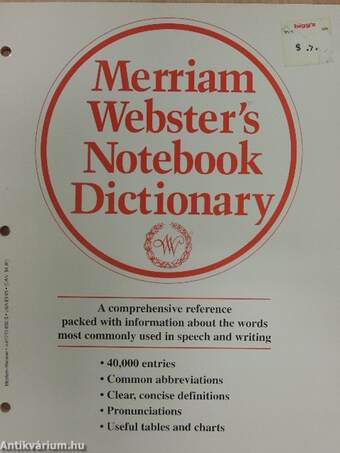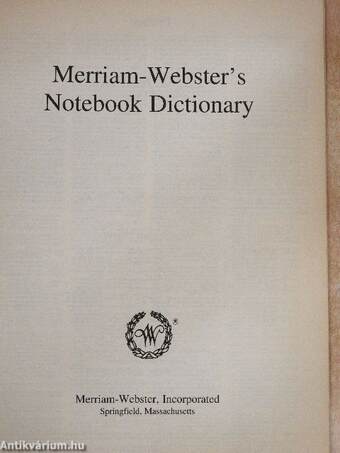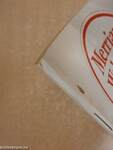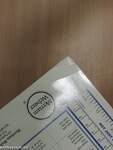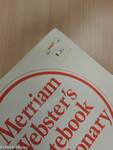1.118.029
kiadvánnyal nyújtjuk Magyarország legnagyobb antikvár könyv-kínálatát
Merriam-Webster's Notebook Dictionary
| Kiadó: | Merriam-Webster, Incorporated |
|---|---|
| Kiadás helye: | Springfield |
| Kiadás éve: | |
| Kötés típusa: | Tűzött kötés |
| Oldalszám: | 92 oldal |
| Sorozatcím: | |
| Kötetszám: | |
| Nyelv: | Angol |
| Méret: | 28 cm x 22 cm |
| ISBN: | 0-87779-650-5 |
naponta értesítjük a beérkező friss
kiadványokról
naponta értesítjük a beérkező friss
kiadványokról
Előszó
Preface
Merriam-Webster's Notebook Dictionary is an extemely concise reference to those words which form the very core of the English vocabulary. This dictionary is one of the smallest of the... Tovább
Előszó
Preface
Merriam-Webster's Notebook Dictionary is an extemely concise reference to those words which form the very core of the English vocabulary. This dictionary is one of the smallest of the family of dictionaries published by Merriam-Webster. It is intended to serve as a quick reference, especially for questions of spelling, pronunciation, and hyphenation of the most common words in everyday use.
This dictionary shares many details of presentation with the more comprehensive members of the Merriam-Webster family, such as Merriam-Webster's Collegiate Dictionary, Tenth Edition. However, conciseness of presentation necessarily requires special treatment of entries, and this book has a number of special features uniquely its own. Users need to be familiar with the following major features of this dictionary.
Main entries follow one another in alphabetical order. Centered periods within the entries show points at which a hyphen may be put when the word is broken at the end of a line.
Homographs (words spelled the same but having different meanings) are run in to a single main entry when they are closely related. Second and succeeding homographs are represented by a swung dash: ~ Homographs of distinctly different origin (as 'date and 2date) are given separate entries with preceding raised numerals.
Variant spellings that are quite common appear at the main entry following a comma (as judg-ment, judgement) and following other boldface entry words, such as inflected forms and run-on entries.
Inflected forms of nouns, verbs, adjectives, and adverbs are shown when they are irregular—as when requiring the dropping of a final e or changing a final y to i before the suffix (as waged; wag'ing at wage) or when the form of the base word itself changes (as rode ; rid-den at ride)—or when there might be doubt about their spelling (as pi egos at ego). They are given either in full (as bet'ter ; best at good) or cut back to a convenient point of division (as -ut«ed; -ut'ing at dis'trib-ute). Common variants of inflected forms are shown even if they are regular (as burst or burst*ed at burst). When the inflected forms of a verb involve no irregularity except the doubling of a final consonant, the double consonant is shown instead of full or cutback inflected forms (as vb -gg- at lug). A variant or inflected form whose alphabetical place is distant from the main entry is entered at its own place with a cross-reference in small capital letters to the main entry (as hung past of HANG).
Several other kinds of entries are also found in this dictionary. A run-in entry is a term related to a main entry that appears within a definition (as small intestine at in-tes'tine). It is set off by parentheses. Derivative words, made up usually of the main entry and a common word element, such as a suffix, are shown as undefined run-on entries following all definitions of a main entry. These are set off by a dash (as — gar'den-er at gar*den). The meaning of an undefined run-on entry can be inferred from the meaning of the main entry where it appears and that of the added
word element, shown elsewhere in the book. A run-on phrase is a group of two or more words having the main entry as a major element and having a special meaning of its own (as in force at force or look after at look). Run-on phrases are always defined.
Lists of undefined words formed by the addition of a common English prefix to a word entered in the dictionary and having meanings that can be inferred from the meaning of the root word and that of the prefix will be found at entries for the following prefixes: anti-, bi-, co-, counter-, extra-, hyper-, in-, inter-, mini-, multi-, non-, over-, post-, pre-, re-, self-, sub-, super-, un-, and vice-.
Vissza


